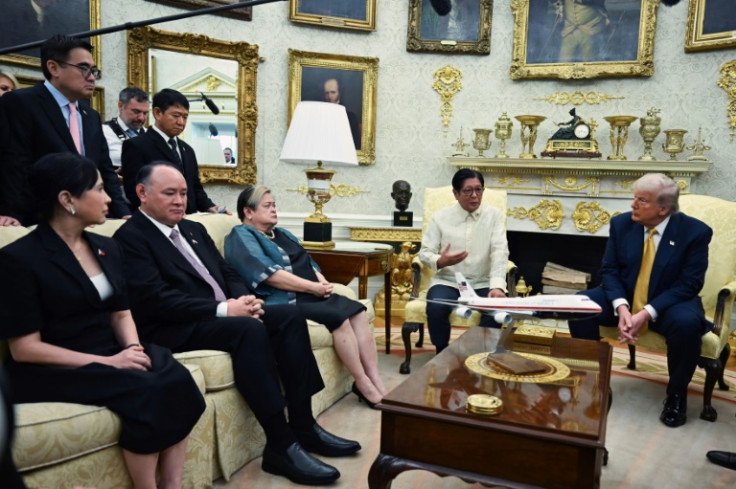Trump Says Confident US To Reach Philippines Trade Deal

US President Donald Trump voiced confidence Tuesday at reaching a trade deal with the Philippines to ease his threatened tariffs as he welcomed his counterpart Ferdinand Marcos to the White House.
"We're very close to finishing a trade deal. A big trade deal, actually," Trump said as he met Marcos in the Oval Office.
"He's a very tough negotiator. So far we're not there because he's negotiating too tough," Trump said.
But Trump, in response to questions, said he believed the two countries would ultimately reach an agreement.
"We'll probably agree on something," Trump said in an appearance in which he spent much of his time attacking predecessors Joe Biden and Barack Obama.
The Philippines, a former US colony and longtime ally, was among countries confronted by Trump with letters this month warning of 20 percent tariffs on all their goods coming into the United States as of August 1 -- up from a previous threat of 17 percent.
The trade rift comes despite increasingly close defense relations between the United States and the Philippines, which has seen high tensions with China.
The United States last year under Biden deployed ground-launched missiles in the Philippines.
Washington has also eyed ammunition manufacturing in the Philippines, despite the closure in 1992 of the US naval base at Subic Bay due to heavy public pressure.
"All of what we consider part of the modernization of the Philippine military is really a response to the circumstances that surround the situation in the South China Sea," Marcos said.
"We are essentially concerned with the defense of our territory and the exercise of our sovereign rights," he said.
"Our strongest, closest, most reliable ally has always been the United States."
China and the Philippines have engaged in a series of confrontations in the contested waters, which Beijing claims almost entirely, despite an international ruling that the assertion has no legal basis.
Trump has frequently questioned Western allies over their military spending, pondering why the United States should defend them in the NATO alliance.
He has voiced fewer doubts about the Philippines. Both Defense Secretary Pete Hegseth and Secretary of State Marco Rubio in meetings with Marcos on Monday vowed to honor the 1951 Mutual Defense Treaty with the Southeast Asian nation.
The Trump administration has identified China as the top US adversary but Trump himself has also boasted of his relationship with Chinese President Xi Jinping.
Speaking alongside Marcos, Trump said he would "probably" visit China at Xi's invitation "in the not-too-distant future."
He said of Marcos, "I don't mind if he gets along with China very well, because we're getting along with China very well."
Trump at the same time said the Philippines had been "maybe tilting toward China" and "we untilted it very, very quickly."
"I just don't think that would have been good for you," Trump said of the former tilt.
Trump credited his own efforts and faulted Biden, although he appeared to be referring to a shift in the Philippines since the 2022 election of Marcos, who also worked closely with the Biden administration.
Marcos's predecessor Rodrigo Duterte had flirted with closer relations with China and bristled at US criticism over human rights under Biden and Obama.
Duterte is facing charges of crimes against humanity at the International Criminal Court over a sweeping campaign against drug users and dealers that rights groups say killed thousands.
© Copyright AFP {{Year}}. All rights reserved.





















